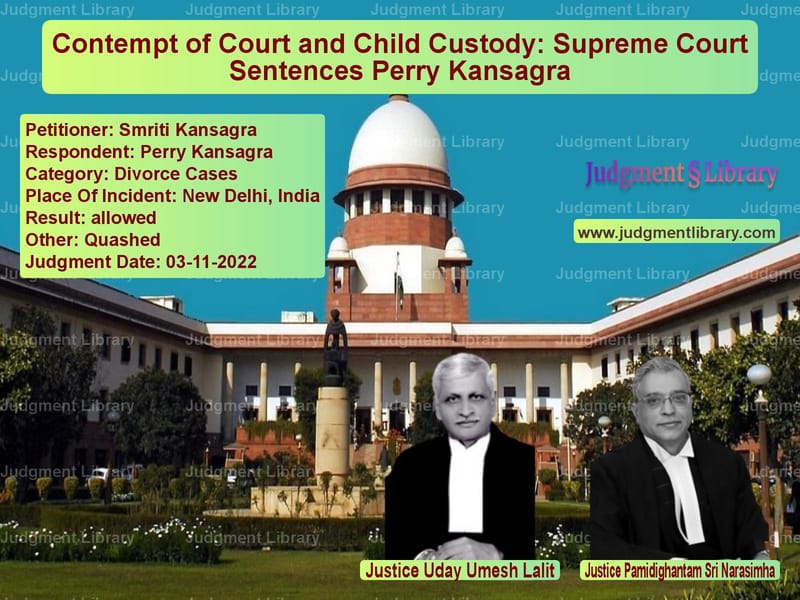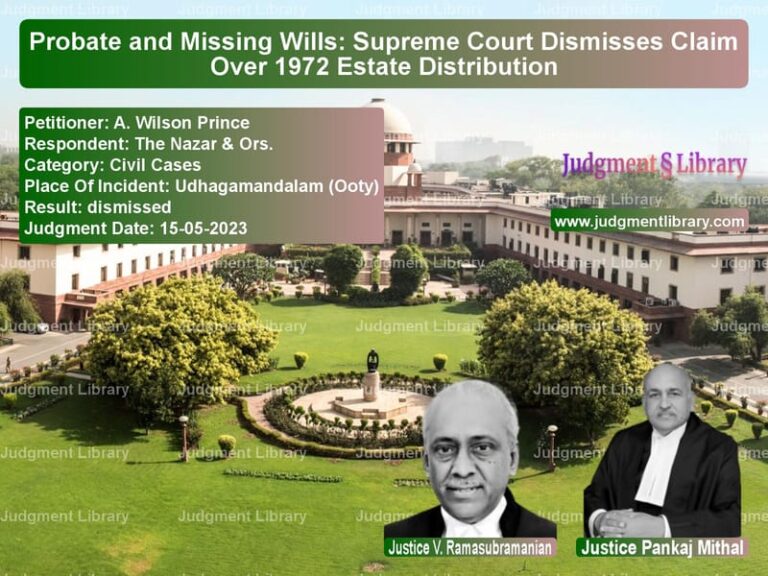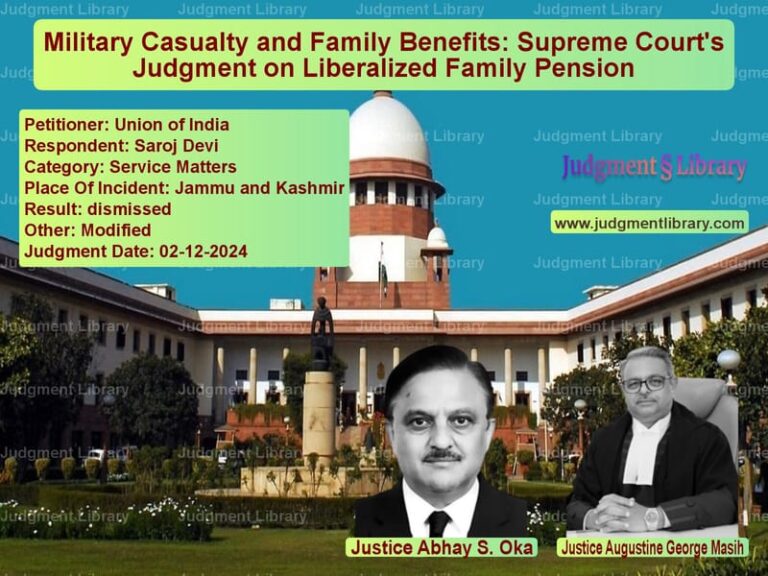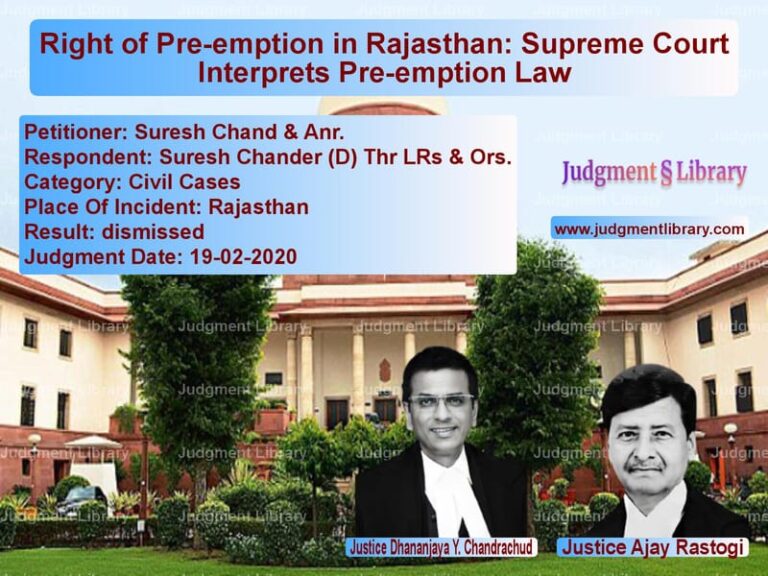Contempt of Court and Child Custody: Supreme Court Sentences Perry Kansagra
The Supreme Court of India recently delivered a significant judgment in a contempt of court case arising from an international child custody dispute. The case involved Perry Kansagra, who had obtained custody of his son Aditya based on undertakings given to the Indian courts but later violated those commitments, leading to legal proceedings for civil and criminal contempt.
Background of the Case
The dispute originated from a custody battle between Perry Kansagra and his wife, Smriti Kansagra, over their son, Aditya. The couple married in 2007 and initially resided in Nairobi, Kenya. Smriti later returned to India, where she raised their son. Legal proceedings for custody began in 2012, with the District Court granting custody to Perry in 2018. This decision was upheld by the Delhi High Court in 2020.
Smriti challenged the decision before the Supreme Court, which, while affirming Perry’s custody, imposed certain conditions to safeguard Smriti’s rights. The court directed Perry to obtain a ‘mirror order’ from a Kenyan court to ensure compliance with visitation and access rights for Smriti. Additionally, he was required to deposit INR 1 crore as a security measure.
Petitioner’s Arguments
Smriti Kansagra and her legal representatives argued:
- Perry had provided false assurances to the court regarding compliance with its directions.
- The ‘mirror order’ from the Kenyan court was never obtained, contrary to the conditions set by the Supreme Court.
- After obtaining custody, Perry cut off communication between Aditya and Smriti, preventing her from exercising her visitation rights.
- Perry misled the court by failing to disclose that the High Court of Kenya had rejected the registration of the Supreme Court’s order.
- His actions amounted to a deliberate fraud upon the Indian judicial system.
Respondent’s Arguments
Perry Kansagra, despite repeated opportunities, failed to appear before the Supreme Court to defend himself. His counsel withdrew from representation, and he did not provide any justification for his actions. He instead approached the Kenyan courts, seeking to invalidate the Indian Supreme Court’s orders.
Supreme Court’s Observations
The Supreme Court made several key observations:
- Perry had “deliberately and with clear intent” misled the court.
- His repeated failure to disclose crucial information, including the rejection of the ‘mirror order’ by the Kenyan High Court, constituted an act of contempt.
- The court emphasized that contempt proceedings are necessary to uphold the authority of the judiciary and ensure compliance with its orders.
- The judgment highlighted that Perry’s actions obstructed justice and affected the rights of Smriti as a mother.
Supreme Court’s Verdict
The Supreme Court convicted Perry Kansagra of both civil and criminal contempt. It imposed the following penalties:
- Six months of simple imprisonment for civil contempt.
- Six months of simple imprisonment for criminal contempt.
- A total fine of INR 25 lakh, to be paid to Smriti to cover legal expenses.
- Directions to the Indian government to secure Perry’s presence for enforcement of the judgment.
Key Takeaways from the Judgment
This case sets an important precedent in international child custody disputes and contempt of court proceedings:
- Enforcement of Judicial Orders: The Supreme Court reaffirmed that failure to comply with court directions, especially in custody matters, attracts serious consequences.
- Accountability in Family Law Disputes: The ruling ensures that parents who violate custody agreements and mislead the court face legal repercussions.
- Jurisdictional Issues in International Custody Cases: The case underscores the challenges of enforcing custody orders across borders, particularly when one party refuses to comply.
Conclusion
The Supreme Court’s ruling in In Re: Perry Kansagra serves as a crucial reminder that legal undertakings must be honored, particularly in sensitive family law cases. By holding Perry accountable, the court has reinforced the principle that contempt of court is a serious offense, ensuring that judicial decisions are respected and enforced.
Petitioner Name: Smriti Kansagra.Respondent Name: Perry Kansagra.Judgment By: Justice Uday Umesh Lalit, Justice Pamidighantam Sri Narasimha.Place Of Incident: New Delhi, India.Judgment Date: 03-11-2022.
Don’t miss out on the full details! Download the complete judgment in PDF format below and gain valuable insights instantly!
Download Judgment: smriti-kansagra-vs-perry-kansagra-supreme-court-of-india-judgment-dated-03-11-2022.pdf
Directly Download Judgment: Directly download this Judgment
See all petitions in Child Custody
See all petitions in Domestic Violence
See all petitions in Divorce by Desertion
See all petitions in Judgment by Uday Umesh Lalit
See all petitions in Judgment by P.S. Narasimha
See all petitions in allowed
See all petitions in Quashed
See all petitions in supreme court of India judgments November 2022
See all petitions in 2022 judgments
See all posts in Divorce Cases Category
See all allowed petitions in Divorce Cases Category
See all Dismissed petitions in Divorce Cases Category
See all partially allowed petitions in Divorce Cases Category







